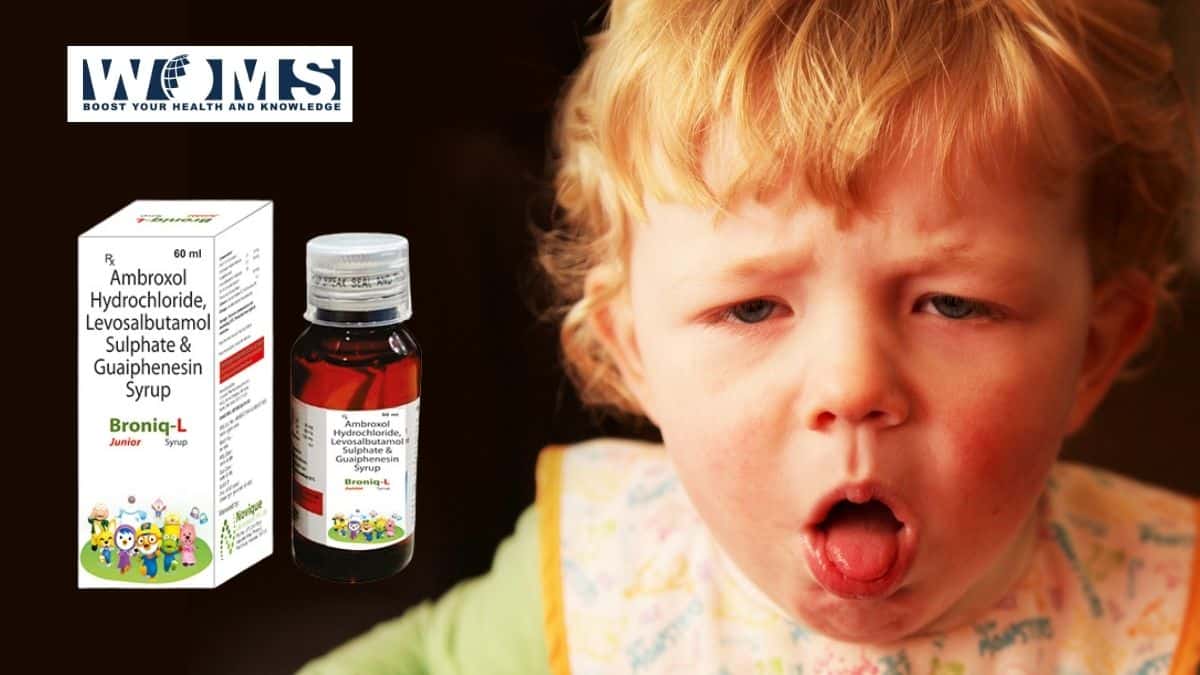How does Ambroxol Hydrochloride treat productive cough?

Ambroxol hydrochloride is a mucolytic agent with systemic activity. It treats productive cough by breaking down mucopolysaccharide fibers within the sputum to make it thinner and less viscous. In this way, the sputum can be easily removed by coughing. The sputum viscosity remains low as long as you continue the treatment.
Doctors prescribe ambroxol hydrochloride in a wide range of respiratory diseases in which there is a production of excessive quantities of mucous.
Brand Names of Ambroxol Hydrochloride
- Mucobrox (Spain)
- Muciclar (Itlay)
- Bisolvon (Australia)
- Ambolar
- Brontex
- Mucol
- Lasolvan
- Mucosolvan
- Surbronc
Dosage Forms of Ambroxol Hydrochloride:
- Syrup (15 mg of ambroxol hydrochloride is present in 5 ml of syrup)
- Tablet (30 mg of ambroxol hydrochloride is present in one tablet)
- Dry powder sachets
- Effervescent tablets
- Inhalation solutions
- Drops
- Ampules
Uses of Ambroxol Hydrochloride
We can treat the following conditions with ambroxol hydrochloride:
- Chronic Inflammatory pulmonary conditions
- Tracheobronchitis ( It helps with preventing excessive cough and mucous production)
- Bronchitis with bronchospasm pneumonia
- Bronchiectasis
- Emphysema (It helps with inflammation of airways and constant cough)
- Ambroxol is also an active agent in some cough syrups.
- Owing to its anesthetic effect, it can treat sore throat and reduces pain on swallowing.
- It can treat Parkinson’s disease due to its positive effect on the activity of the enzyme glucocerebrosidase.
How does Ambroxol Hydrochloride work?
Ambroxol hydrochloride alleviates productive cough and works by breaking down mucopolysaccharidefibers within the sputum to make it thinner and less viscous. In this way, the sputum can easily spit out on coughing (expectoration). The sputum viscosity remains low as long as you continue the treatment. This allows patients to breathe comfortably.
Another mechanism by which this medication works is the release of surfactant by pulmonary alveoli. Surfactant is a substance that reduces adherence of mucous to the bronchus. Thisindeed protects against infection.
Dosage
- Age up to 2 years: A half teaspoon of ambroxolhydrochloride syrup two times a day
- Age 2-5 years: A half teaspoon of the syrup thrice a day
- Above 5 years: One teaspoon of ambroxol syrup thrice a day
- For adults: the recommended dose is 30 mg (one tablet) to 120 mg (four tablets) two to three times a day
Directions to use Ambroxol Hydrochloride
- Read the leaflet thoroughly which comes with the medication before starting ambroxol hydrochloride. Follow your physician’s instructions properly.
- In case of any queries, consult your physician from time to time to guide you.
- Do not increase the dose of the medication without consulting your health care provider.
- Take the medication regularly at a fixed time to achieve maximum benefits.
- The medication can be taken with or without food.
- Swallow it as a whole (in the case of tablet). Do not chew, crush or break it.
- it is advised not to consume more than the recommended dose.
- Do not use it after the expiration date.
- In case of bronchitis, doctors prescribe antibiotics (such as amoxicillin) along with ambroxol hydrochloride for better relief.
Precautions
- Before you start using ambroxol hydrochloride, inform your doctor if youare allergic to the medication or any active or inactive ingredient in the medication.
- Keep out of the reach of children and pets.
- Store in a cool and dry place.
- Use the medication according to the doctor’s instructions. Do not increase the dosage or frequency as it can result in aggravation of side effects.
- Do not use ambroxol hydrochloride after the expiry date.
- Dispose of the medicine properly and do not flush it down the toilet.
- If you take the medication out of its original packing or container, it cannot be stored properly. So keep it in its original container for proper storage.
- Do not keep it in moist conditions such as in the washroom or at the sink. Moisture can destroy the medication.
- Do not share or recommend the medication to anyone else even if they have the same symptoms.
- Do not use the medication for other diseases for which the doctor did not prescribe it.
Side Effects of Ambroxol Hydrochloride
Your doctor might be well aware of your condition and would have recommended the medication after weighing the risks against its benefits. Nevertheless, side effects are prone to occur in some population, and these include:
- Gastrointestinal discomfort
- Skin rash
- Weakness
- Dizziness
- Indigestion
- Diarrhea
- Taste disturbances
- Dry mouth
- Allergies
- Numbness in mouth and throat
- Heartburn
- Abdominal pain
- Infections
Contraindications of Ambroxol Hydrochloride
Do not use Ambroxol Hydrochloride in the case of:
- Patients with gastric ulcerations
- Pregnancy
Although there is a limited study available regarding the harmful effects of ambroxol on humans, it is unsafe to use in pregnancy. Always consult your doctor before starting with the medication during pregnancy (particularly in the first trimester).
3. Breastfeeding
The drug might pass into the breast milk. So lactating mothers are advised not to take the medication.
4. Kidney and liver disease
Dosage adjustment might be required in kidney disease. So inform your doctor if you suffer from kidney disease before taking this medication.
5. Patients with lactose intolerance
Ambroxol hydrochloride contains lactose as an inactive ingredient. For that reason, it is not suitable for usage in a patient who have lactase enzyme deficiency (lactase is an enzyme that breaks down lactose sugar).
6. Chronic cough
7. Asthma
8. Allergic reaction:
If you are allergic toany active or inactive ingredient in this medication, do not take this medication and inform your doctor about any allergic reaction.
Interactions of Ambroxol Hydrochloride with other medications
Before starting ambroxol hydrochloride, inform your doctor about all prescription and non-prescription drugs you are already taking.Certain medications can have reactions when given with other medicines, so they should not be used together.Keep a list of all the medicines with you and show it to your doctor. Above all, do not start or stop any medication by yourself without consulting your doctor.
Ambroxol has mild to severe interactions with other drugs. Inform your doctor if you take any of the following medications:
- Immune-suppressing medications
- Chemotherapy
- Antibiotics (as ambroxol HCL increases the penetration of antibiotics)
Reactions in case of other medical problems
Inform your doctor if you suffer from other medical problems as it can interfere with the use of this medication.
Tell your doctor if you especially have the following medical problems:
- Cold
- Weakened immune system (such as in AIDS and organ transplant patients who are taking immune-suppressing medications)
For how long can I take ambroxol hydrochloride?
Your doctor will adjust your dosage according to your condition as the dosage is individualized. However, you should not take ambroxol for more than 4 to 5 days without consulting your health care provider.
Storage
Store ambroxol hydrochloride in a cool and dry place. Keep it away from moisture and heat. The temperature should be between 15 to 30 degrees Celsius. Do not place in the refrigerator in any case.
Addiction Liability
Ambroxol HCL can cause mild drowsiness and dizziness. However, it is not a habit-forming drug i.e., it has no abuse potential.
When to visit the doctor
Your doctor may prescribe you ambroxol hydrochloride in the view that its benefits are greater than the risk of side effects. However, inform your doctor if you notice any of the following symptoms or if the side effects worsen:
- Yellow or green coloured sputum
- Trouble in breathing
- Blood in mucus
- Chest pain
- High-grade fever
- Eye swelling
- Skin lesions
Overdosage
Overdosing on this drug can have severe effects. If someone has overdosed on ambroxol HCL, contact your doctor as soon as possible or the poison control center.
Overdosage means more frequent use of the drug than your doctor prescribed or used in higher doses than recommended.
Ambroxol Hydrochloride Guaifenesin:
This is a combination medication consisting of ambroxol, guaifenesin, and levosalbutamol. It treats productive cough effectively.
Ambroxol is a mucolytic that thins the mucous and makes it less viscous. This makes it easier to cough out the mucous. Guaifenesin is an expectorant that reduces the adherence of mucous to the bronchial passages and makes the removal of mucus easy at the same time. Levosalbutamol is a bronchodilator that dilates the bronchial airways. This is due to its ability to relax smooth muscles in particular.
A Little Comprehension
To summarize, ambroxol hydrochloride is basically a mucolytic agent. This means that it makes the sputum thinner and less viscous. In this way, it helps cure productive cough. Moreover, it can help treat Parkinson’s disease and Gaucher disease due to its ability to increase the activity of the lysosomal enzyme, glucocerebrosidase. Avoid its use in pregnant and breastfeeding women, patients of liver and kidney disease, and patients with asthma or chronic cough. Taking the medication regularly at fixed times and in doses advised by your doctor can result in rapid and better effects in the long run.
Frequently asked questions
What is ambroxol hydrochloride?
It is a mucolytic agent. It alleviates productive cough and works by breaking down mucopolysaccharidefibers within the sputum to make it thinner and less viscous. In this way, the sputum can easily spit out on coughing (expectoration). This allows patients to breathe comfortably. It also causes the release of surfactant by pulmonary alveoli. Surfactant is a substance that reduces adherence of mucous to the bronchus. This protects against infection.
Can ambroxol treat a sore throat?
Yes, it can treat sore throat due to its anesthetic effect. It reduces pain in swallowing.
What if I miss a dose?
If you miss a dose or forget to take one, consume it as soon as you remember. If it’s time for the next dose, skip the previous one. Never take a double dose at a time. If you forget doses often, set an alarm as a reminder.
How should I store the medication?
Remember to store ambroxol hydrochloride in a cool and dry place. Keep it away from moisture and heat. The temperature should be between 15 to 30 degrees Celsius. If you take the medication out of its original packing or container, it cannot be stored properly. So keep it in its original container for proper storage.
What do I need to tell my doctor before using ambroxol?
Inform your doctor about an allergic reaction to the active ingredients in the medication. Also, let your doctor know if you have any health conditions such as asthma, colds, chronic cough, AIDS or you are pregnant or plan to become pregnant.
How to dispose of the medication?
When disposing of the medication, discard the product appropriately. Do not flush or pour it into the drain until instructed. Contact your physician or local waste disposal company for instructions on how to discard the product safely.
Can I can ambroxol on an empty stomach?
You can take ambroxol three times a day with 120 mg (four tablets) being the maximum dosage. Yes, you can take it with or without food.
What are the side effects of Ambroxol hydrochloride?
he side effects of this medication include; gastrointestinal discomfort, skin rash, weakness, dizziness, indigestion, diarrhea, taste disturbances, dry mouth, allergies, numbness in the mouth and throat, heartburn, and abdominal pain.
How does it help in treating Parkinson’s disease?
Ambroxol hydrochloride increases the activity of the lysosomal enzyme, glucocerebrosidase. In this way, it helps in treating Parkinson’s disease.
What is the adult dose of Ambroxol?
The adult dose of ambroxol hydrochloride is 30 mg (one tablet) to a maximum of 120 mg (four tablets) two to three times a day.




